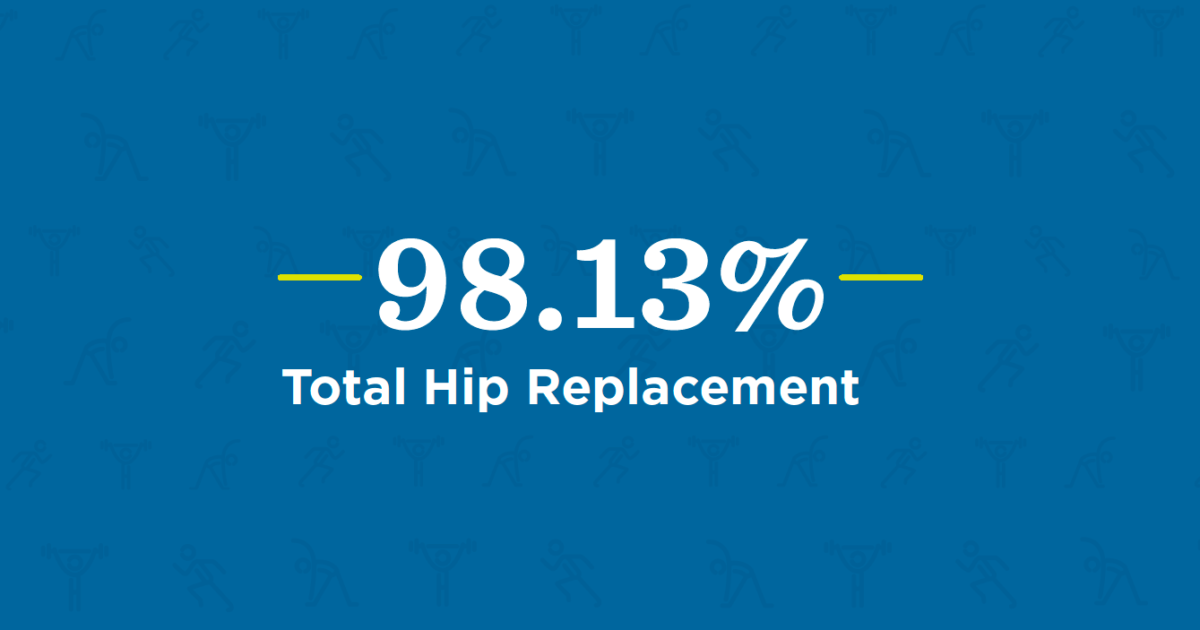
December 17, 2019 - TCO
Quality & Outcomes: Total Hip Replacement
At Twin Cities Orthopedics, we have a responsibility to our patients, their families, and our communities as a whole, to make health care better for everyone. That’s why for the past several years we’ve been analyzing surgical outcomes, gathering feedback about your experiences, and putting the data to good use.
About Our Data
After every experience with TCO, we kindly ask our patients to provide feedback. We ask about their overall experience, and whether or not they would recommend us to family and friends. We ask them to tell us about their pain and mobility before and after surgery, so we can monitor their progress and customize their care experience.
Thanks to the generosity of patients who filled out forms after their visits, we’ve collected nearly half a million patient surveys. That’s an incredible amount of information, and we’re grateful for every patient who has contributed.
We’re using this data to make improvements across our practice and elevate the experience for everyone at TCO.
Why Data Matters
Healthcare is evolving, and people deserve to be in the driver’s seat of their own care. At TCO, we’re developing tools so patients can make more educated decisions about their health. By publishing data about surgical outcomes and patient satisfaction, we hope prospective patients will feel empowered to:
- Ask their physicians about surgical outcomes, and feel more prepared
- Ask their providers about how much procedures cost, and feel more in control
- Ask their families and friends about who they would recommend, and feel more confident
- Ask their employers how they make healthcare decisions, and feel more involved
- Ask tough questions, and hold our industry accountable
Change doesn’t happen overnight, and we’ll never stop trying to earn people’s trust, but 98% of our patients would recommend TCO to family and friends, which tells us we’re on the right track.
Learn More: Total Hip Replacement Surgery
“Are you NOT doing things because of your hip? If you are making life decisions based on the ability to use your hip, then something needs to be done.” –Dr. Randall Lewis
Patient-reported outcome data for total hip arthroplasty, more commonly known as total hip replacement, tells us that 98.13% of TCO patients report increased hip functionality one year after surgery. In other words, you can be very confident you’ll have improved hip mobility if you choose to have this procedure.
About the Procedure
- Total hip arthroplasty (THA) is considered by many to be one of the most successful surgeries in history. It involves removing the arthritic surfaces of the hip and replacing the surfaces with metal alloy and titanium with a polymer piece in between.
- The procedure typically takes 1-2 hours depending on the severity of arthritis and the patient’s body size and shape.
- Patients who are generally healthy and have a good support system may qualify to have their procedure through our EXCEL Surgery & Recovery
- Hip replacements typically last for 20-30 years in most patients.
- 98.13% of TCO patients report increased hip functionality after surgery, when surveyed one year post-surgery.
What to Expect
- After the procedure, it is normal to feel pain, stiffness, bruising and swelling. It is very important to remember that you cannot harm the new hip, and that your own hard work will be the biggest factor in recovery.
- Almost all of our patients are back walking the day of surgery.
- Formal physical therapy is typically not required, but exercises at home are critical to successful recovery.
- After total hip replacement surgery, get back into the gym as soon as you can. It can be a powerful thing for your psychology, in addition to the physical benefits.
- After a right hip replacement, you may legally drive after 4 weeks, provided you feel safe getting to the brake. For a left hip replacement, you may drive once you’re off any narcotic pain medications you may have been prescribed.
- Patients with phone and computer jobs can typically return to work as soon as their mind is clear, generally 5-7 days post-op.
- Patients who sit at their jobs usually return at 3-6 weeks, depending on the ability of their employer to allow for elevation, position change, and the occasional “early day” home if there is discomfort.
- Patients with walking, driving, or standing jobs (ex: sales, nursing, cashier) can typically return between 6-10 weeks.
- Heavier jobs (ex: cleaning, labor, factory) often require 3-4 months before returning to work. We recommend patients speak to their managers and human resources to discuss their specific situations.
Special thanks to Dr. Lewis for his insights into the procedure.
If you or a loved one is considering total hip replacement surgery, or would like to speak to a TCO hip specialist, we’re here to help.
- Find a Location: schedule an appointment at a convenient location near you.
- Find a Physician: contact our team of experts.

